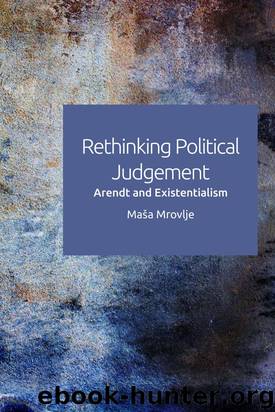Rethinking Political Judgement by Maša Mrovlje

Author:Maša Mrovlje
Language: eng
Format: epub
Publisher: Edinburgh University Press
The World of the Narrative and the Activity of Political Judgement in Its Worldly Ambiguity
Just as the act of narration is only enabled by the existence of a gap between recounting and what is recounted, the readers’ freedom brings into existence a gap between narrative and their own world which establishes the possibility of passing from the narrated story back to life – while acknowledging their difference. The starting point of recent proponents of the ethical and political value of narrative sensibility, such as Martha Nussbaum and Wayne Booth, is an enquiry into the experiential reality of this gap, into the ways it is assumed by situated freedoms. On this account, narrative ethics is based on what Booth calls ‘coduction’ performed by readers, an active participation in the communal discussion and evaluation of the literary work (Booth 1988: 72, 252–72). The emphasis shifts from an enquiry into what kind of literary works merit reading, to ‘what kind of live encounter a given reading experience is like’ (Booth 1988: 169, 202–21). The phenomenological analysis of engagements with literary works begins with readers’ acknowledgement that, as an act of creative retelling, narrative is an act of world-disclosure, rather than knowledge or truth. As Ricoeur (1981b: 201–2) says, it opens up ‘a world for us’. The existential–phenomenological orientation shies away from the ‘epistemological’ focus of both the traditional, historiographical view of narrative as (objective) representation of outside reality, and the postmodern emphasis on instituting a narrative text as a place of the endless deconstruction of all referentiality (see White 1987; 1984; Brunner 1991). As Sartre and Beauvoir insisted, narrative is an appeal to assume responsibility for what has been disclosed and take it up as a ground for our own acts of judgement. In the act of reading, as Nussbaum (1995: 83) has put it, we are ‘constituted’ so as to assume the position of spectators and judges of the manifold affairs of humankind.2
In Nussbaum, however, this appeal is envisioned to proceed by way of stimulating our ‘knowledge of possibilities’ (Nussbaum 1995: 31, 44; 1997: 86). Drawing on Aristotle, Nussbaum believes literature intimates the process of judging because it introduces us to a plethora of events ‘that might happen’, reveals ‘their impact on human lives’ and allows us to evaluate in general terms the ‘possibilities for being human’ (Nussbaum 1997: 92, 110; 1995: 126). This is because the reader is able to imagine what it would feel like to be struck by the same misfortunes as those plaguing the lives of literary characters, but is sufficiently distanced so as to be capable of critical judgement (Nussbaum 1995: 72–6). In this morally desirable position for judging, ‘we find [. . .] love without possessiveness, attention without bias, involvement without panic’ (Nussbaum 1990: 162). An engagement with literature occurs in the calm and controlled space of the reader’s inner self. Literature, as Vasterling (2007: 84) notes, assumes the role of an ‘ethics lab’, where we can train our capacities of proper understanding and adequate response without the disturbing intrusion of contingency that confronts us in the outer world.
Download
This site does not store any files on its server. We only index and link to content provided by other sites. Please contact the content providers to delete copyright contents if any and email us, we'll remove relevant links or contents immediately.
Big Boys' Rules: The SAS and the Secret Struggle Against the IRA by Mark Urban(408)
This Land Is Their Land by David J. Silverman(368)
Emancipation After Hegel by Todd McGowan;(310)
Human Rights Education by Bajaj Monisha; Flowers Nancy;(251)
Rethinking Political Judgement by Maša Mrovlje(246)
